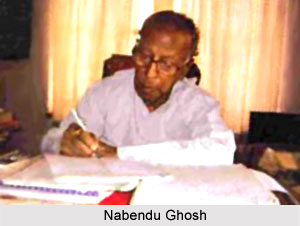 Nabendu Ghosh was born in 1918. He had been a leading Bengali novelist of his times and has written the screenplay for some of Bollywood movies as well. Dacca, Bangladesh was his birthplace and there earned a post-graduate degree in English literature. He, however, chose to write in Bengali - his mother tongue. His first step towards fame was in 1945 with the controversial novel Dak Diye Jayee. The novel is set in the canvas of the Indian national movement; unfortunately, the colonial government banned the book.
Nabendu Ghosh was born in 1918. He had been a leading Bengali novelist of his times and has written the screenplay for some of Bollywood movies as well. Dacca, Bangladesh was his birthplace and there earned a post-graduate degree in English literature. He, however, chose to write in Bengali - his mother tongue. His first step towards fame was in 1945 with the controversial novel Dak Diye Jayee. The novel is set in the canvas of the Indian national movement; unfortunately, the colonial government banned the book.
Biography of Nabendu Ghosh
After resigning from the Bihar Secretariat from the clerical post, Ghosh moved to Kolkata in 1945. Very soon, he emerged as one of the leading progressive writers of the region. It was director Bimal Roy who introduced him into Hindusthani cinema. When Bimal Roy joined Bombay Talkies to direct Man, he made up his team along with him, which included Ghosh, Salil Choudhury, Hrishikesh Mukherjee and Asit Sen. Ghosh`s moving screenplays played a fundamental part in Roy`s significant successes such as Biraj Bahu, Devdas, and Sujata.
Through the decades, Ghosh worked in collaboration with such leading directors as Dulal Guha, Satyen Bose, Guru Dutt, and Hrishikesh Mukherjee. Besides several literary awards, he also won the Best Screenplay Writer Award in 1968, Filmfare Award for the Hrishikesh Mukherjee-directed Manjhli Didi. Nabendu Ghosh became directing films in regular pace from 1988 with the critically acclaimed film Trishagni. Ashok Kumar`s biography, Ashok Kumar: His Life and Times (1998 was also authored by him.
Filmography of Nabendu Ghosh
| Year | Film | Year | Film |
| 1952 | Maa | 1969 | Aamoo Ban Gaye Phooh |
| 1954 | Biraj Bahu; Aar Paar, Naukri | 1970 | Sharafar |
| 1955 | Devdas | 1972 | Rajajani |
| 1958 | Yahudi | 1981 | Krodhi |
| 1959 | Sujata | 1973 | Abhimaan |
| l966 | Teesri Kasam | 1978 | Ganga Ki Saugandh |
| 1967 | Manjhli Didi | 1988 | Trishagni |
| 1968 | Raja Aur Runk | 1993 | Who Chokri |













